人教版PEP五年级英语上册重要知识点归纳
五年级上册英语人教PEP版知识要点期末复习重点版
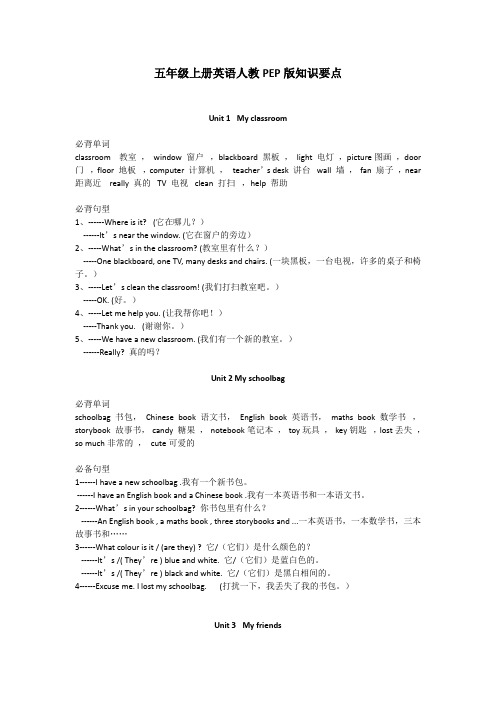
五年级上册英语人教PEP版知识要点Unit 1 My classroom必背单词classroom 教室,window 窗户,blackboard 黑板,light 电灯,picture图画,door 门,floor 地板,computer 计算机,teacher’s desk 讲台wall 墙,fan 扇子,near 距离近 really 真的TV 电视clean 打扫,help 帮助必背句型1、------Where is it? (它在哪儿?)------It’s near the window. (它在窗户的旁边)2、-----What’s in the classroom? (教室里有什么?)-----One blackboard, one TV, many desks and chairs. (一块黑板,一台电视,许多的桌子和椅子。
)3、-----Let’s clean the classroom! (我们打扫教室吧。
)-----OK. (好。
)4、-----Let me help you. (让我帮你吧!)-----Thank you. (谢谢你。
)5、-----We have a new classroom. (我们有一个新的教室。
)------Really? 真的吗?Unit 2 My schoolbag必背单词schoolbag 书包,Chinese book 语文书,English book 英语书,maths book 数学书,storybook 故事书,candy 糖果,notebook笔记本,toy玩具,key钥匙,lost丢失,so much非常的,cute可爱的必备句型1------I have a new schoolbag .我有一个新书包。
------I have an English book and a Chinese book .我有一本英语书和一本语文书。
人教版PEP五年级上册英语 基础知识汇总

人教版PEP五年级上册基础知识汇总Unit 1 What’s he like?重点单词:[四会]old 老的;年纪大的young 年轻的;岁数不大的funny 滑稽的;可笑的kind 体贴的;慈祥的;宽容的strict 要求严格的;严厉的polite 有礼貌的;客气的helpful 有用的;愿意帮忙的clever 聪明的;聪颖的shy 羞怯的;脸典的;怕生的hard-working 工作努力的;辛勤的[三会]know 知道;了解o ur 我们的will(谈及将来)将要sometimes 有时;间或robot 机器人him(用作宾语或表语)他finish 完成;做好Ms(用于女子的姓氏或姓名前,不指明婚否)女士speak 会说;会讲(某种语言);用(某种语言)说话重点短语:funny teachers 滑稽的老师tall and strong 又高又壮speak English 说英语speak Chinese 说汉语talk with sb. 和某人讲话join you 加入你们our new Chinese teacher 我们的新语文老师a good football player 一名优秀的足球运动员must be 一定(是)finish my homework 完成我的家庭作业字母y在单词中的发音: /ɪ/, /aɪ/出现在词尾:happy开心的sorry对不起sky天空shy羞怯的fly 飞行/j/出现在词头:yes 是yellow 黄色young 年轻的you 你;你们重点句型:1.确认某人体貌特征或性格特点的句型: Be动词+主语+描述体貌特征或性格特点的形容词?-- Is he young? 他年轻吗?-- Yes,he is. /No,he isn't. 是的,他年轻。
/不,他不年轻。
2.询问对方的某个学科老师是谁的句型: Who's your +学科+ teacher?-- Who's your English teacher? 你的英语老师是谁?-- Miss White. 怀特小姐。
人教版PEP五年级英语上册重要知识点归纳
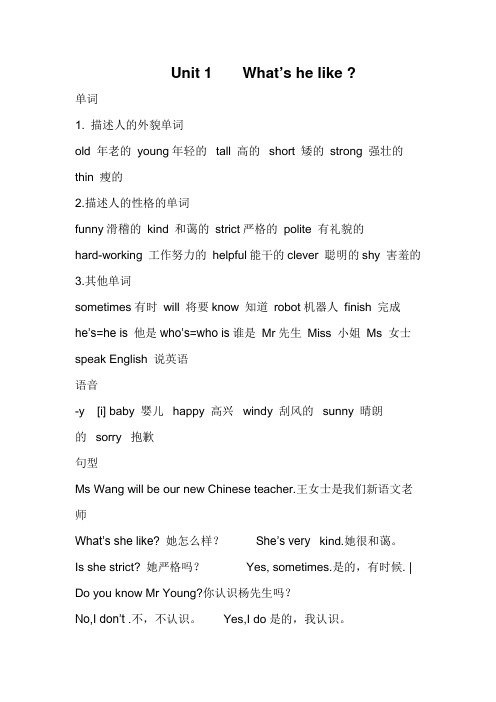
Unit 1 What’s he like ?单词1. 描述人的外貌单词old 年老的young年轻的tall 高的short 矮的strong 强壮的thin 瘦的2.描述人的性格的单词funny滑稽的kind 和蔼的strict严格的polite 有礼貌的hard-working 工作努力的helpful能干的clever 聪明的shy 害羞的3.其他单词sometimes有时will 将要know 知道robot机器人finish 完成he’s=he is 他是who’s=who is谁是Mr先生Miss 小姐Ms 女士speak English 说英语语音-y [i] baby 婴儿happy 高兴windy 刮风的sunny 晴朗的sorry 抱歉句型Ms Wang will be our new Chinese teacher.王女士是我们新语文老师What’s she like? 她怎么样?She’s very kind.她很和蔼。
Is she strict? 她严格吗?Yes, sometimes.是的,有时候. | Do you know Mr Young?你认识杨先生吗?No,I don’t .不,不认识。
Yes,I do是的,我认识。
Who is your maths teacher? 谁是你的数学老师?Mr Li李先生。
Is he funny? 他严格吗?Yes,he is.是的,他搞笑。
No,he isn’t.不,不搞笑。
语法点1.Be(is, am, are) 的用法口诀be动词am is are ;我(I)用am,你(you)用are; is连着他,她,它(he, she, it); 我们,你们和他们(we, you, they),全部都用are2. be like与do like:What’s…like?是问”某某长什么样子?”的意思。
它的答语一般用:He/She/ It is…(后面跟描写人的外貌特征的词语)。
pep人教版五年级英语上册各单元知识点归纳

五年级英语上册期末总复习班级:___________________ 姓名:___________________Unit1 What he like?一.重点单词(能听,说,读,写的单词)old年老的young年轻的funny 滑稽的kind和蔼的strict严格的polite 礼貌的helpful乐于助人的shy害羞的hard-working勤奋的clever聪明的二.三会单词(会听,说,读的单词)shy 害羞的 sometimes有时 will 将要 know 知道robot 机器人 finish 完成she’s =she is 她是he‵s=he is 他是who‵s=who is谁是what’s =what is 什么是Mr.先生Miss 小姐Ms女士三.语音(能分辨清Yy 的发音)发音y /i/ baby宝宝happy开心的candy糖果windy刮风的sunny晴朗的sorry 对不起/ai/ shy sky try fly cry my/j/ yellow yo-yo yes young yard三.重点句型:(深黑色字体的要求会听,说,读,写)1、A: Ms Wang will be our new Chinese teacher.王女士使我们新语文老师A: What’s she like?她怎么样?B: She’s very kind? 她很和蔼A: Is she strict? 她严格吗?B:Yes,sometimes. 是的,有时候.2、A: Do you know Mr Young?你认识杨先生吗?B: No,I don’t (否定回答)不,不认识。
Yes,I do(肯定回答)是的,我认识。
3、A: Who is your math teacher? 谁是你的数学老师?B: Mr Li李先生。
4、A: Is she strict? 她严格吗?B: Yes,she is.(肯定回答)是的,她严格。
人教版PEP五年级英语上册知识点汇总

Unit 1 What's he like?重点单词old 老的,年纪大的young 年轻的,岁数不大的funny 滑稽的,可笑的kind 体贴的,慈祥的,宽容的strict 要求严格的,严厉的polite 有礼貌的,客气的shy 羞怯的,腼腆的,怕生的helpful 有用的,愿意帮忙的clever 聪明的,聪颖的hard-working 工作努力的,辛勤的music 音乐art 美术science 科学English 英语maths/math 数学Chinese 语文,中文sometimes 有时,间或robot 机器人speak 会说,会讲(某种语言);用(某种语言)说话重点句子1. —Who's your art teacher? 谁是你的美术老师?—Mr. Jones.琼斯老师。
2. —Is he young? 他年轻吗?—Yes, he is. 是的,他年轻。
—No, he isn't. 不,他不年轻。
3. —What's Wu Yifan like? 吴一帆怎样?—He's hard-working. 他很勤奋。
4. Ms Wang will be our new Chinese teacher. 王老师会成为我们的新语文老师。
5. He is very helpful at home. 他在家很能干。
6. Robin is short but strong. 罗宾个子矮,但是身体强壮。
7. He can speak Chinese and English. 他会说中文和英语。
8. He makes me finish my homework. 他让我写作业。
语音字母y在单词中的发音:1、双音节或多音节词末发[ i ]。
例:bab y happ y windy sunn y sorr y cand y man y famil y part y婴儿开心的有风的晴朗的对不起糖果许多家庭聚会课外补充:2、y在单音节词末发[ ai ]例:b y 乘坐m y 我的wh y 为什么cr y 哭fl y 飞重点知识及语法1、询问他人的外貌或性格:-What's he/she like? - He/She is kind/…2、一般疑问句的问与答:—Is he/she…?—Yes, he/she is.—No,he/she isn't.—Do you know…? —Yes, I do.—No, I don't3、be动词的三种形式am, is, are与人称代词连用的用法:I + am,He, she, it,人名、物名+ isWe, you, they + are4、Ms., Miss, Mr., Mrs.的区别:Ms. [miz](缩略词)(用于女子的姓氏或姓名前,不指明婚否)女士;Miss [mis](用于未婚女子的姓氏或姓名前,以示礼貌)小姐,女士;Mr. [mistE](mister的缩略词)(用于男子的姓氏或姓名前)先生;Mrs. [misiz](用于已婚女子的姓氏或姓名前)太太;夫人。
最新人教版PEP英语五年级上册知识点归纳
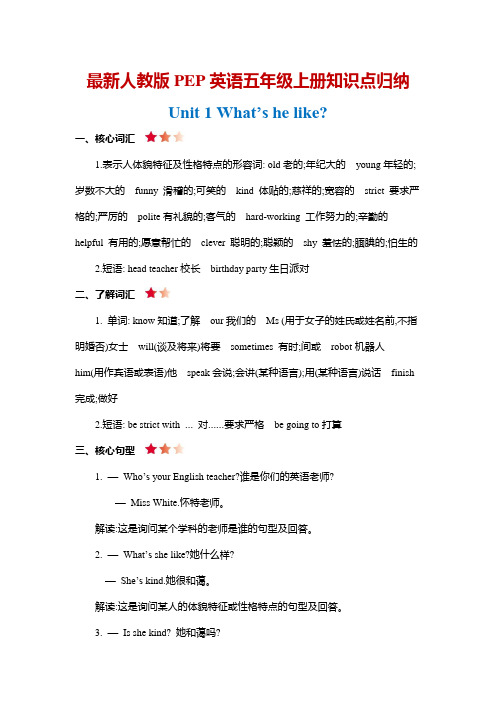
最新人教版PEP英语五年级上册知识点归纳Unit 1 What’s he like?一、核心词汇1.表示人体貌特征及性格特点的形容词: old老的;年纪大的young年轻的;岁数不大的funny 滑稽的;可笑的kind 体贴的;慈祥的;宽容的strict 要求严格的;严厉的polite有礼貌的;客气的hard-working 工作努力的;辛勤的helpful 有用的;愿意帮忙的clever 聪明的;聪颖的shy 羞怯的;腼腆的;怕生的2.短语: head teacher校长birthday party生日派对二、了解词汇1. 单词: know知道;了解our我们的Ms (用于女子的姓氏或姓名前,不指明婚否)女士will(谈及将来)将要sometimes 有时;间或robot机器人him(用作宾语或表语)他speak会说;会讲(某种语言);用(某种语言)说话finish 完成;做好2.短语: be strict with …对……要求严格be going to打算三、核心句型1. —Who’s your English teacher?谁是你们的英语老师?—Miss White.怀特老师。
解读:这是询问某个学科的老师是谁的句型及回答。
2. —What’s she like?她什么样?—She’s kind.她很和蔼。
解读:这是询问某人的体貌特征或性格特点的句型及回答。
3. —Is she kind? 她和蔼吗?—Yes, she is.是的,她和蔼。
解读:这是询问某人性格特点的一般疑问句,用yes或no回答。
4. He is very helpful at home.他在家里非常愿意帮忙。
解读:这是描述他人特征的句型。
四、了解句型1. Hey, Ms Wang will be our new Chinese teacher.嘿,王老师将会是我们的新语文老师。
解读: will表示将要发生的动作或状态,意思是“将要”,后加动词原形。
人教PEP版小学英语五年级上册知识点汇总(全一册)

PEP版小学英语五年级上册知识点汇总Unit 1 What’s he like?1. 描述人的外貌单词old 老的young 年轻的tall 高的short 矮的fat 胖的thin 瘦的2. 描述人的性格的单词kind 和蔼的strict 严厉的polite 有礼貌的clever 聪明的hard-working 努力的helpful 乐于帮助人的3. 重点句型(1)---Who’s your E nglish/ music/art/science/maths/Chinese teacher?(谁是你的英语/音乐/美术/科学/数学/语文老师?)---Mr. /Miss./Mrs./Ms. Jones. 琼斯先生/琼斯小姐/琼斯太太/琼斯女士(2)---What’s she/he like? ---She/He is clever.对人的性格和外貌提问,可用上面表示外貌和性格的单词回答。
(3)---Is he/she strict? 他/她严厉么?肯定回答Yes, he/ she is. 是,很严厉。
否定回答No, he/ she isn’t. 不,不严厉。
人教PEP版小学英语五年级上册知识点汇总Unit 2 My week1.星期一到星期天首字母要大写。
Monday 星期一(Mon.)Tuesday 星期二(Tues.)Wednesday 星期三(wed.)Thursday 星期四(Thur.)Friday星期五(Fri.) Saturday 星期六(Sat.)Sunday 星期天(Sun.)2.watch TV 看电视do homework 家庭read books 看书wash my clothes洗衣服play football踢足球3.本单单元重点学习怎样问星期及怎样回答。
今天是星期几?What day is it today?1。
PEP人教版五年级上英语Unit1知识点、考点梳理精编

PEP人教版五年级上英语Unit1知识点、考点梳理精编知识点梳理:1. 单词:表示家庭成员的名词,如father(父亲)、mother(母亲)、brother(兄弟)、sister(姐妹)、grandfather(外祖父)、grandmother(外祖母)、uncle(叔叔)、aunt(阿姨)等。
2. 句型:询问家庭成员的句型,如Who's this/that?(这/那个是谁?),It's my father/mother/brother/sister/grandfather/grandmother/uncle/aunt.(这是我爸爸/妈妈/哥哥/姐姐/外公/外婆/叔叔/阿姨。
)3. 短语:表示家庭关系的短语,如爸爸的妈妈(father's mother)、妈妈的爸爸(mother's father)等。
4. 介词:表示所属关系的介词,如of(的),用于连接家庭成员与其所属关系的词语,如father of(...的父亲)、mother of(...的母亲)等。
考点梳理:1. 听力:辨别家庭成员的听力题,根据听到的描述或问句选择正确的家庭成员名称。
2. 口语:回答关于家庭成员的问题,根据问题回答正确的家庭成员名称。
3. 语法:掌握询问家庭成员的句型,以及回答这个句型的正确用法。
4. 理解:理解描述家庭关系的短语,能够根据短语理解家庭成员之间的关系。
5. 书写:正确拼写家庭成员的单词,注意大小写和单复数的变化。
6. 翻译:能够翻译一些关于家庭成员的句子,包括询问和回答家庭成员的句型,以及描述家庭关系的短语。
注:以上内容为人工智能根据题目和知识点推断出的可能答案,仅供参考。
最新pep人教版小学五年级英语上册各单元知识点归纳
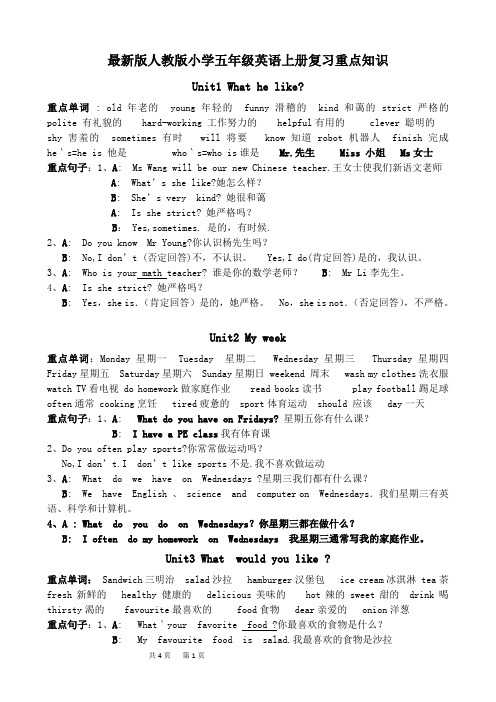
最新版人教版小学五年级英语上册复习重点知识Unit1 What he like?重点单词 : old 年老的 young年轻的 funny滑稽的 kind 和蔼的 strict严格的polite 有礼貌的 hard-working 工作努力的 helpful有用的 clever 聪明的shy 害羞的 sometimes有时 will 将要 know 知道 robot 机器人 finish 完成he‵s=he is 他是 who‵s=who is谁是Mr.先生 Miss 小姐 Ms女士重点句子:1、A: Ms Wang will be our new Chinese teacher.王女士使我们新语文老师A: What’s she like?她怎么样?B: She’s very kind? 她很和蔼A: Is she strict? 她严格吗?B: Yes,sometimes. 是的,有时候.2、A: Do you know Mr Young?你认识杨先生吗?B: No,I don’t (否定回答)不,不认识。
Yes,I do(肯定回答)是的,我认识。
3、A: Who is your math teacher? 谁是你的数学老师?B: Mr Li李先生。
4、A: Is she strict? 她严格吗?B: Yes,she is.(肯定回答)是的,她严格。
No,she is not.(否定回答),不严格。
Unit2 My week重点单词:Monday 星期一 Tuesday 星期二 Wednesday 星期三 Thursday 星期四Friday星期五 Saturday星期六 Sunday星期日 weekend 周末 wash my clothes洗衣服watch TV看电视 do homework做家庭作业 read books读书 play football踢足球often通常 cooking烹饪 tired疲惫的 sport体育运动 should 应该 day一天重点句子:1、A: What do you have on Fridays?星期五你有什么课?B: I have a PE class我有体育课2、Do you often play sports?你常常做运动吗?No,I don’t.I don’t like sports不是.我不喜欢做运动3、A: What do we have on Wednesdays ?星期三我们都有什么课?B: We have English 、 science and computer on Wednesdays.我们星期三有英语、科学和计算机。
人教版PEP小学英语五年级上册知识复习要点

人教版PEP小学英语五年级上册知识复习要点在小学五年级上册的英语教学中,学生将继续学习更多有关基础英语的知识和技能。
这个年级的学习重点包括拼读、词汇、语法和句子构造等方面。
下面将总结人教版PEP小学英语五年级上册的知识复习要点,帮助学生复习和巩固所学内容。
一、拼读1. 复习26个英文字母的发音和拼写。
2. 复习元音字母及其发音,如 a, e, i, o, u。
3. 复习辅音字母及其发音,如 b, c, d, f 等。
4. 复习发音规则,如字母组合 ch, sh, th, wh 的发音。
二、词汇1. 复习学过的动物名称,如 dog, cat, lion 等。
2. 复习学过的食物名称,如 apple, banana, cake 等。
3. 复习学过的家庭成员名称,如 father, mother, sister 等。
4. 复习学过的身体部位名称,如 head, arm, leg 等。
5. 复习学过的颜色名称,如 red, blue, yellow 等。
三、语法1. 复习句子的基本结构,即主语+谓语的形式。
2. 复习肯定句和否定句的构造,如 I like apples. / I don't like apples.3. 复习一般疑问句的构造,如 Do you like apples? / Does he like apples?4. 复习选择疑问句的构造,如 Is it a cat or a dog?5. 复习形容词的基本用法,如 tall, short, big 等。
四、句子构造1. 复习构造简单的陈述句,如 I have a book.2. 复习构造简单的祈使句,如 Open the door.3. 复习构造简单的感叹句,如 What a beautiful flower!4. 复习使用正确的句型构造对话,如 A: What's your name? B: My name is Tom.五、其他1. 复习数字的表达和认读,如1-100的数字。
人教版五年级上册英语知识点重点难点考点汇总
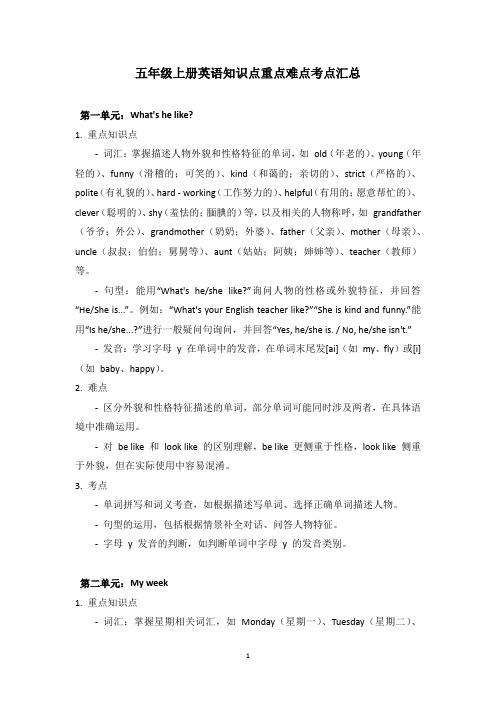
五年级上册英语知识点重点难点考点汇总第一单元:What's he like?1. 重点知识点-词汇:掌握描述人物外貌和性格特征的单词,如old(年老的)、young(年轻的)、funny(滑稽的;可笑的)、kind(和蔼的;亲切的)、strict(严格的)、polite(有礼貌的)、hard - working(工作努力的)、helpful(有用的;愿意帮忙的)、clever(聪明的)、shy(羞怯的;腼腆的)等,以及相关的人物称呼,如grandfather (爷爷;外公)、grandmother(奶奶;外婆)、father(父亲)、mother(母亲)、uncle(叔叔;伯伯;舅舅等)、aunt(姑姑;阿姨;婶婶等)、teacher(教师)等。
-句型:能用“What's he/she like?”询问人物的性格或外貌特征,并回答“He/She is...”。
例如:“What's your English teacher like?”“She is kind and funny.”能用“Is he/she...?”进行一般疑问句询问,并回答“Yes, he/she is. / No, he/she isn't.”-发音:学习字母y 在单词中的发音,在单词末尾发[ai](如my、fly)或[i](如baby、happy)。
2. 难点-区分外貌和性格特征描述的单词,部分单词可能同时涉及两者,在具体语境中准确运用。
-对be like 和look like 的区别理解,be like 更侧重于性格,look like 侧重于外貌,但在实际使用中容易混淆。
3. 考点-单词拼写和词义考查,如根据描述写单词、选择正确单词描述人物。
-句型的运用,包括根据情景补全对话、问答人物特征。
-字母y 发音的判断,如判断单词中字母y 的发音类别。
第二单元:My week1. 重点知识点-词汇:掌握星期相关词汇,如Monday(星期一)、Tuesday(星期二)、Wednesday(星期三)、Thursday(星期四)、Friday(星期五)、Saturday(星期六)、Sunday(星期日),以及课程和日常活动词汇,如Chinese(语文)、English(英语)、maths(数学)、science(科学)、music(音乐)、PE(体育)、art(美术)、wash my clothes(洗衣服)、watch TV(看电视)、do homework(做作业)、read books (读书)等。
小学英语人教版pep五年级上知识点
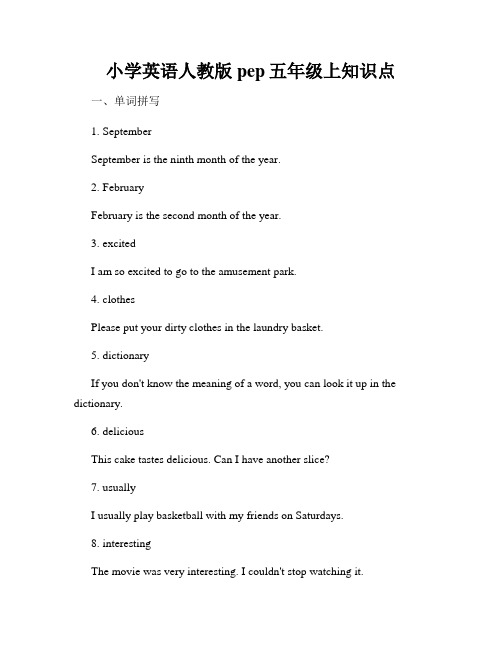
小学英语人教版pep五年级上知识点一、单词拼写1. SeptemberSeptember is the ninth month of the year.2. FebruaryFebruary is the second month of the year.3. excitedI am so excited to go to the amusement park.4. clothesPlease put your dirty clothes in the laundry basket.5. dictionaryIf you don't know the meaning of a word, you can look it up in the dictionary.6. deliciousThis cake tastes delicious. Can I have another slice?7. usuallyI usually play basketball with my friends on Saturdays.8. interestingThe movie was very interesting. I couldn't stop watching it.9. behindThe cat is hiding behind the curtains.10. dangerousClimbing mountains can be dangerous, so you need to be careful.二、短语应用1. talk aboutLet's talk about our summer vacations during the class meeting.2. look forI can't find my pencil. Can you help me look for it?3. get upI get up at 7 o'clock every morning to get ready for school.4. take care ofDon't forget to take care of your little sister when Mom is not at home.5. go shoppingWe can go shopping at the mall after school.6. have a picnicThe weather is so nice today. Let's have a picnic in the park.7. be good atMy sister is good at playing the piano. She practices every day.8. go swimmingWe often go swimming in the pool during the summer.9. be interested inI am interested in learning how to play the guitar.10. go campingMy family likes to go camping in the mountains during the holidays.三、句型转换1. My father drives a car to work. (变为一般疑问句)Does my father drive a car to work?2. They are playing soccer in the park. (变为否定句)They are not playing soccer in the park.3. She likes to dance on weekends. (变为否定句)She doesn't like to dance on weekends.4. We have English class every Monday. (变为一般疑问句)Do we have English class every Monday?5. The cat is sleeping under the table. (变为否定句)The cat is not sleeping under the table.6. They can swim very well. (变为一般疑问句)Can they swim very well?7. He has a red bicycle. (变为一般疑问句)Does he have a red bicycle?8. We usually go to the park on Sundays. (变为一般疑问句) Do we usually go to the park on Sundays?9. She is reading a book in the library. (变为否定句)She is not reading a book in the library.10. I like to eat ice cream in the summer. (变为一般疑问句) Do you like to eat ice cream in the summer?四、阅读理解A: Hello, what's your name?B: Hi, I'm Lily. What's your name?A: I'm Tom. Nice to meet you, Lily.B: Nice to meet you, too, Tom.A: Are you new in this school?B: Yes, I am. How about you?A: No, I've been here for two years.B: That's cool. Can you show me around the school?A: Of course! Let's go.根据对话内容,回答以下问题:1. What is the girl's name?Her name is Lily.2. What is the boy's name?His name is Tom.3. How long has Tom been in the school?He has been in the school for two years.4. Is Lily new in the school?Yes, she is new in the school.5. Does Tom agree to show Lily around the school?Yes, Tom agrees to show Lily around the school.以上是小学英语人教版PEP五年级上的一些知识点,包括单词拼写、短语应用、句型转换和阅读理解。
人教版pep英语五上各单元重点知识

人教版pep英语五上各单元重点知识1. Unit 1: Hello!In this unit, students will learn basic greetings, classroom language, and numbers. They will also be introduced to the topic of countries and nationalities. Through various activities and exercises, students will be able to practice speaking, listening, and reading in English. It is important for students to master these basic greetings and numbers as they form the foundation for further language acquisition.2. Unit 2: My School DayThis unit focuses on daily routines and telling the time. Students will learn how to talk about their daily schedule and activities, as well as tell the time using both digital and analog clocks. It is essential for students to understand and be able tomunicate about their daily routines as it is a fundamental aspect ofmunication.3. Unit 3: At the FarmIn this unit, students will learn about farm animals, their habitats, and the sounds they make. They will also be exposed to simple adjectives to describe the animals. It is crucial for students to understand the vocabulary related to farm animals as it expands their knowledge of the world around them.4. Unit 4: Food and DrinksThis unit introduces students to various types of food and drinks. They will learn vocabulary related to different meals, fruits, and beverages. Understanding this vocabulary is important for students as it enables them to express their preferences and make choices when ites to food and drinks.5. Unit 5: Let's CelebrateIn this unit, students will learn about different celebrations and festivals around the world. They will be exposed to vocabulary related to celebrations and traditions. It is important for students to learn about different cultures and traditions as it promotes cultural awareness and understanding.6. Unit 6: Our ClothesThis unit focuses on clothing and the weather. Students will learn vocabulary related to different types of clothing and how to describe the weather. This knowledge is important for students as it allows them to talk about their clothing preferences and the weather conditions in their daily lives.In conclusion, the key knowledge and skills covered in the first five units of the People's Education Press (PEP) English textbook for fifth grade are essential for students to develop a solid foundation in English language learning. Mastering these units will enable students tomunicate effectively and confidently in various everyday situations. It is important for students to continue practicing and reinforcing these skills in order to build upon their English proficiency.My personal understanding of these key knowledge points is that they form the building blocks for students' language acquisition. Each unit introduces new vocabulary, grammar structures, and cultural knowledge that contribute to a holistic language learning experience. It is crucial for students to grasp these concepts in order to progress to more advanced language skills in the future.Overall, the curriculum in the PEP English textbook for fifth grade provides aprehensive and well-structured approach to English language learning. By focusing on practical and applicable language skills, it equips students with the necessary tools tomunicate effectively in real-life situations. I believe that this early exposure to English language and culture will greatly benefit students in their future academic and professional endeavors.This article is not only a guide for me but for all the fifth-grade students who are using the PEP English textbook. I hope that it serves as a helpful resource for understanding and mastering the key knowledge and skills presented in the textbook.。
人教版pep英语小学五年级(上)知识点归纳
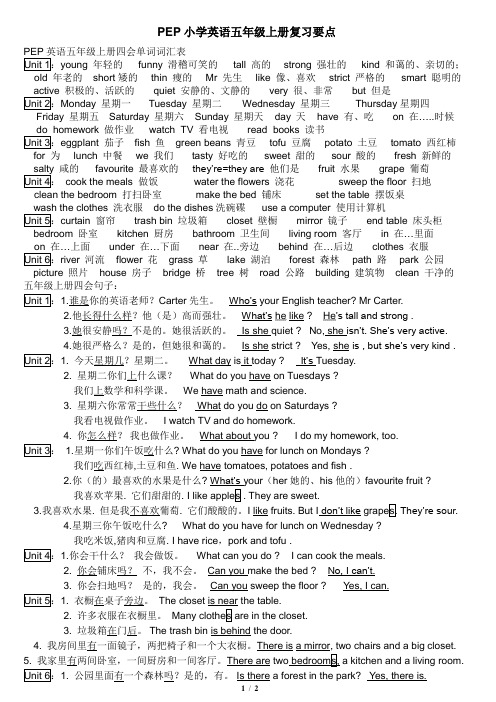
PEP小学英语五年级上册复习要点young 年轻的 funny 滑稽可笑的 tall 高的 strong 强壮的kind 和蔼的、亲切的;short矮的thin 瘦的Mr 先生like 像、喜欢strict 严格的smart 聪明的积极的、活跃的quiet 安静的、文静的very 很、非常but 但是Monday 星期一Tuesday 星期二 Wednesday 星期三 Thursday星期四星期五Saturday 星期六 Sunday 星期天 day 天 have 有、吃 on 在…..时候做作业watch TV 看电视read books 读书eggplant 茄子fish 鱼green beans 青豆tofu 豆腐potato 土豆tomato 西红柿lunch 中餐we 我们tasty 好吃的sweet 甜的sour 酸的fresh 新鲜的咸的favourite 最喜欢的they’re=they are 他们是fruit 水果grape 葡萄cook the meals 做饭water the flowers 浇花sweep the floor 扫地打扫卧室make the bed 铺床set the table 摆饭桌洗衣服do the dishes洗碗碟use a computer 使用计算机curtain 窗帘trash bin 垃圾箱closet 壁橱mirror 镜子end table 床头柜卧室kitchen 厨房bathroom 卫生间living room 客厅in 在…里面…上面under 在…下面near 在..旁边behind 在…后边clothes 衣服river 河流 flower 花 grass 草lake 湖泊forest 森林path 路park 公园照片 house 房子 bridge 桥 tree 树road 公路building 建筑物clean 干净的五年级上册四会句子:1.谁是你的英语老师?Carter先生。
PEP人教五年级英语上册知识点总结期末重点知识归纳
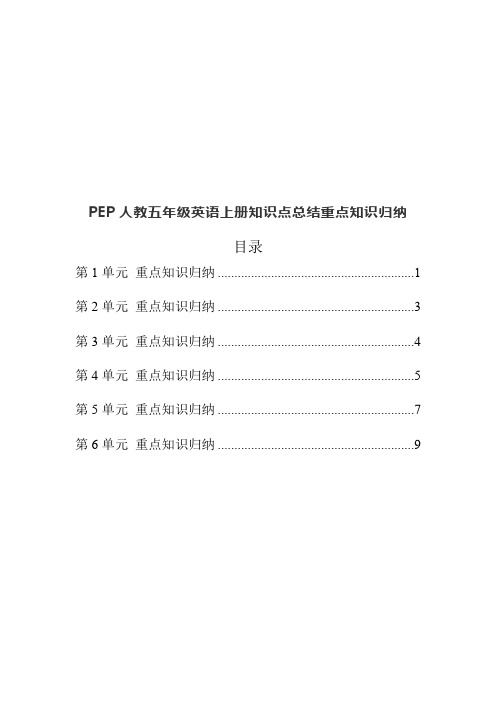
PEP人教五年级英语上册知识点总结重点知识归纳目录第1单元重点知识归纳 (1)第2单元重点知识归纳 (3)第3单元重点知识归纳 (4)第4单元重点知识归纳 (5)第5单元重点知识归纳 (7)第6单元重点知识归纳 (9)第1单元重点知识归纳四会单词:young年轻的funny滑稽可笑的tall高的strong强壮的kind和蔼的old年老的short矮的thin瘦的Mr先生like像;喜欢strict严格的smart聪明的;巧妙的active积极的;活跃的quiet安静的;文静的very很;非常but但是缩写形式:who’s=who iswhat’s=what ishe’s=he isshe’s=she is重要句型:1.Who’s your art teacher?你们的美术老师是谁?----Mr Hu.胡先生.2.What’s he like?他长得什么样子?----He’s short and thin.他又矮又瘦3.Is she young?她年轻吗?----Yes,she is/No, she isn’t.以前的知识:I have a new math teacher.我有一个新数学老师.(小学三年级已经学过I have a pen.)注意: 划线部分可以替换.第2单元重点知识归纳四会单词:Monday星期一Tuesday星期二Wednesday星期三Thursday星期四Friday星期五Saturday星期六Sunday星期日day天;日子have有;吃on 在……时候too也;太短语:do homework做作业watch TV看电视read books读书What about?......怎么样?do housework做家务play computer games玩电脑游戏重点句型:1.What day is it today?今天星期几?—It’s Monday.星期一.2.What do we have on Mondays?星期一我们有什么课?—We have English,science,computer and P.E.我们有英语课,科学,计算机跟体育课.3.What do you do on Saturdays?星期六你干什么?(具体的某一天前用介词on,在具体的时间前,用介词at)—I often do my homework.我通常做家庭作业.4.What about you?你呢?—I do my homework,too.我也是做家庭作业.第3单元重点知识归纳四会单词:eggplant茄子fish鱼green beans青豆tofu豆腐potato土豆tomato西红柿for为;给lunch中餐;午饭we我们tasty好吃的;可口的sweet甜的sour酸的fresh新鲜的salty咸的favourite最喜爱的;特别喜爱的fruit水果grape葡萄缩写形式:they’re=they are don’t=do not重点句型:1.What would you like for lunch?你午餐想吃什么?-----I’d like some tomatoes and mutton.我想吃一些西红柿跟羊肉.2.What’s your favourite fruit?你最喜欢的水果是什么?------/I like apples.我喜欢苹果.3.I don’t like grapes.我不喜欢葡萄.4.Bananas are my favourite.我最喜欢香蕉.第4单元重点知识归纳一. 单词:empty the trash倒垃圾cook the meals 做饭water the flowers浇花sweep the floor扫地clean the bedroom打扫卧室make the bed铺床set the table摆餐具wash the clothes洗衣服do the dishes洗碗碟put away the clothes收拾衣服can’t = cannot(不会;不能)use a computer(使用计算机)二. 句子:1. I’m helpful! I can sweep the floor。
五年级上册英语复习重点
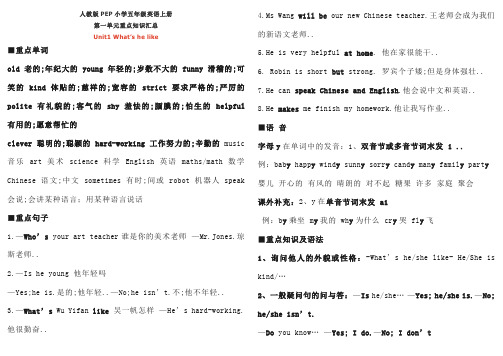
人教版PEP小学五年级英语上册第一单元重点知识汇总Unit1 What’s he like■重点单词old 老的;年纪大的 young 年轻的;岁数不大的 funny 滑稽的;可笑的 kind 体贴的;慈祥的;宽容的 strict 要求严格的;严厉的polite 有礼貌的;客气的shy 羞怯的;腼腆的;怕生的helpful 有用的;愿意帮忙的clever 聪明的;聪颖的 hard-working 工作努力的;辛勤的music 音乐art 美术science 科学English 英语maths/math 数学Chinese 语文;中文 sometimes 有时;间或 robot 机器人speak 会说;会讲某种语言;用某种语言说话■重点句子1.—Who’s your art teacher谁是你的美术老师—Mr.Jones.琼斯老师..2.—Is he young 他年轻吗—Yes;he is.是的;他年轻..—No;he isn’t.不;他不年轻.. 3.—What’s Wu Yifan like吴一帆怎样—He’s hard-working. 他很勤奋..4.Ms Wang will be our new Chinese teacher.王老师会成为我们的新语文老师..5.He is very helpful at home. 他在家很能干..6. Robin is short but strong. 罗宾个子矮;但是身体强壮..7.He can speak Chinese and English.他会说中文和英语..8.He makes me finish my homework.他让我写作业..■语音字母y在单词中的发音:1、双音节或多音节词末发 i ..例:bab y happ y wind y sunn y sorr y cand y man y famil y part y婴儿开心的有风的晴朗的对不起糖果许多家庭聚会课外补充:2、y在单音节词末发 ai例:b y乘坐 m y我的 wh y为什么 cr y哭 fl y飞■重点知识及语法1、询问他人的外貌或性格:-What’s he/she like- He/She is kind/…2、一般疑问句的问与答:—Is he/she… —Yes; he/she is.—No; he/she isn’t.—Do you know… —Yes; I do.—No; I don’t3、be动词的三种形式am; is; are与人称代词连用的用法:I + am;He; she; it;人名、物名+ isWe; you; they + are4、Ms.; Miss; Mr.; Mrs.的区别:Ms.miz缩略词用于女子的姓氏或姓名前;不指明婚否女士;Missmis用于未婚女子的姓氏或姓名前;以示礼貌小姐;女士;Mr.mistEmister的缩略词用于男子的姓氏或姓名前先生;Mrs.misiz用于已婚女子的姓氏或姓名前太太;夫人..5、and和but的区别:and “和;与”;表并列关系He is tall and thin. 他又高又瘦.. but “但是”;表转折关系He is short but strong. 他个子矮;但是身体强壮..■重点作文1、介绍自己、朋友或老师等熟悉的人物;如:My …teacher/friend/…..思路导引1开头:交代人物的身份I have a/an…He/She is…2中间:1体貌He/ She is tall/st rong…He/She has …hair/eyes…2性格He/She is strict/kind…3爱好 He/She likes playing ping-pong/…或He/She often read books/…on the weekend.3结尾:评价人物或抒发对人物的情感 I like him/her very much.2、范文:1课本P9 Read and writeMy Chinese teacherI have a new Chinese teacher. She is Ms. Chen. She is tall and thin. She is kind and funny. Sometimes she is strict; too. She is hard-working. She likes reading. Her class is so much fun. We all like her.Unit2 My week■重点单词Sunday Sun. 周日 Monday Mon. 周一 Tuesday Tue./Tues. 周二Wednesday Wed./Weds. 周三 Thursday Thur./Thurs. 周四Friday Fri. 周五 Saturday Sat. 周六 weekend 周末周六、日wash my clothes 洗衣服 watch TV 看电视 do homework 做作业read books 看书 play football 踢足球 on the weekend 在周末play sports/do sports 做体育运动 listen to music 听音乐play ping-pong 打乒乓球■重点句子1. —What do you have on Thursday s星期四你们上什么课—I have math; English and music. 我们上数学、英语和音乐课..2. —What do you do on Thursdays; Grandpa 爷爷;星期四你要做什么—I have a cooking class with your grandma. 我和你奶奶去上烹饪课..3. —Do you often read books in this park 你经常在这个公园看书吗—Yes;I do.是的—No;I don't.不是4. Look at my picture. 看我的图片..5. You look tired. 你看起来很累..6. You should play sports every day. 你应该每天做运动..■语音字母组合ee; ea在单词中的的发音: i:例:f ee t b ee f m ee t s ee f ee d t ea r ea d ea t rep ea t脚牛肉遇见见面看见喂养茶阅读吃重复注:1、ee组合绝大部分发长音 i: ;只有少部分发短音 i ;如:coffee 咖啡2、ea字母组合除了发 i: ;还有可能发 e 等发音;如:bread 面包;或者发 ei ;如:great 好极了■重点知识及语法1、询问做什么事/活动:—What do you do … —I often play ping-pong…询问星期几上什么课:—What do you have on… —We have English class…2、一般疑问句的问与答:—Do you often read books —Yes; I do. —No; I don't.3、 on+具体某一天年月日;星期;如:on Mondays/Tuesdays…记得加s课外 at+具体时刻…点钟;如:at12 o'clock 在十二点整补充:in+大致时间年月;早中晚;如:in2014 在2014年in the morning/afternoon/evening4、play + 球类、棋类、娱乐活动;如:play football/ping-pong 补充:play + the + 乐器第四单元知识;如:play the pi pa/piano/violin…■重点作文1、描写一周的生活;如:My week思路导引1开头:简单的自我介绍:My name's…/ I'm…2中间:·介绍周一至周五的情况;可以着重介绍自己最喜欢的那一天:I go to school from Monday to Friday. I like…because I have…·介绍自己周六、日的活动:I often watch TV/…on the weekend. 3结尾:This is my week. What about yours2、范文:My weekMy name is Li Ming. I go to school from Monday to Friday. I like Tuesdays and Thursdays; because I have music and PE. I often do my homework and read books on Saturdays. I often play ping-pong on Sundays.Unit3 What would you like■重点单词ice cream 冰淇淋 hamburger 汉堡包 tea 茶 sandwich 三文治salad 沙拉fresh 新鲜的;刚摘的healthy 健康的delicious 美味的;可口的hot 辣的;辛辣的 sweet 含糖的;甜的 hungry 饿的thirsty 渴的;口渴的favourite 特别喜爱的food 食物drink 喝;饮 carrot 胡萝卜 onion 洋葱chicken 鸡肉 milk 牛奶 bread 面包 beef noodles 牛肉面fish sandwich 鱼肉三明治tomato soup 西红柿汤■重点句子1.—What would you like to eat 你想吃什么—A sandwich; please. 请给我一个三明治..—What would you like to drink 你想喝什么—I'd like some water. 我想喝点水..2. —What's your favourite food你最喜欢吃什么食物—Noodles. They are delicious. 面条..面条很好吃..3. My/His /Her favourite food is fish. 我/他/她最喜欢的食物是鱼..4. I'm hungry/thirsty. 我饿/渴了..5. I don't like beef but chicken is OK. 我不喜欢牛肉但是鸡肉也可以..6. Onions are my favourite vegetable. 洋葱是我最喜欢的蔬菜..7. I like vegetables but not carrots. 我喜欢吃蔬菜但不喜欢胡萝卜..■语音字母组合ow在单词中的发音:au ; u例: au cow奶牛 flower 花 wow哇 down 向下 how如何;怎样now现在u slow慢的 snow雪 yellow黄色 window窗户 snowy 下雪的tomorrow明天■重点知识及语法1、询问想要吃/喝什么:—What would you like to eat/drink —I'd like…2、询问最喜欢的事物:—What's your favourite food/vegetable/… —My favourite food/…is…/I like…3、名词复数的规则变化:1直接加s;2以s; x; sh; ch结尾的;加es;如; buses boxes sandwiches3以o结尾;有生命的加es;如;potatoes tomatoes无生命的加s;如;photos pianos zoos补充:4以辅音加y结尾;改y为i再加es;如;families babies以元音加y结尾;直接加s;如;boys days5以f或fe结尾;改f为v再加es;如knife-knives小刀leaf-leaves树叶4、some+可数/不可数名词例:some apples可数some water/rice/juice/bread/…不可数■课外补充:不可数名词词后不可以加-s/es;所接动词用单数is /V-s/es液体 water milk tea orange桔汁 coke juice气体 air空气食物food rice bread fruit肉类meat肉 fish beef chicken物质work工作 paper纸 time music weather天气 snow money■重点作文1、描述自己和家人最喜爱的食物思路导引1开头:简单介绍自己的家庭成员:There are…people in my family. They are…2中间:分别介绍每个家庭成员最喜爱的食物时什么:…favourite food is…/…is…favourite./…likes…best.3结尾:穿插说明喜欢的原因:It's/They're…2、范文:1课本P29 Read and write2 There are four people in my family. My mother likes salad best. It's fresh. Beef is my father's favourite. He thinks 认为it's delicious. My brother likes ice cream. It's sweet. My favourite food is fish. It's very healthy.Unit 4 What can you do■重点单词dance 跳舞 sing English songs 唱英文歌曲 play the pi pa 弹琵琶do kung fu 打功夫 draw cartoons 画漫画 swim 游泳speak English 说英语 cook 烹饪;烹调 play basketball 打篮球play ping-pong 打兵乓球 draw pictures 画画 clean the classroom 打扫课室■重点句子1. We'll have an English party next Tuesday 我们下周二将举行英语派对..2. —What can you do for the party 你能为派对做些什么呢—I can sing English songs. 我能唱英文歌..3. How/What about you 你呢4. Can you do any kung fu 你会打功夫吗—Yes; I can. 是的;我会.. —No; I can't. 不;我不会..5. No problem. I can help you. 没问题..我会帮你..6. I can play ping-pong; but I can't swim. 我会打乒乓球;但我不会游泳..7. Please send me an email at■语音字母组合oo在单词中的发音: u ; u:例:u l oo k 看g oo d 好的b oo k 书c oo k 烹饪w oo d 木头f oo t 脚助记口诀:1. 看look好good书book;砍柴wood做饭cook洗脚foot..2. 押韵记忆:Look good book; cook wood foot.u: ball oo n 气球 f oo d 食物 z oo动物园 n oo dles 面条注:字母组合oo发音少数发短音 u ;多数发长音 u: ..■重点知识及语法1、询问对方会做什么事情:—What can you do —I can play the pi pa.2、can句型的否定句:I can't play the pi pa.3、can句型的一般疑问句的问与答:—Can you do any kung fu —Yes;I can./No; I can't.4、play + the + 乐器;例 play the er hu /pi pa /piano…play + 球类、棋类、娱乐活动;例play basketball/football/ping-pong…5、some与any的异同:相同之处:都有“一些”的含义;不同之处:some+可数名词复数/不可数名词用于肯定句中例:I can do some kung fu. 我会打功夫..any+可数名词复数/不可数名词用于否定句或疑问句中例:I can't do any kung fu. 我不会打功夫.. Can you do any kung fu 你会打功夫吗课外补充:1any还可以用于肯定句;作“任何的”解..例:Any student can answer this question. 任何学生都能回答这个问题..2在表示建议;请求的疑问句中;或期望得到肯定回答时;用some而不用any..例:Would you like some coffee 你想来点咖啡吗■重点作文1、描写自己或家庭成员会做的事情;如:I'm helpful / Super family;思路导引1开头:介绍自己或家庭成员的基本情况:I'm… I'm…years old.I have a super family. There are three people in my family. They are…2中间:介绍自己在家和在学校里会做的事情/介绍家人的外貌性格以及会做的事情:I can…at school. I can…at home.My father is strong. He can do some kung fu. My mother is…She can…3结尾:总结 This is me. What can you doThis is my family. I love my family. Can you tell me your family/What about your family2、范文:1课本P43 Read and write2Hello; I'm Zhao Ming. I'm eleven years old. I'm helpful. I can clean the windows and sweep the floor at school. I can cook and wash my clothes at home.I often play the pi pa on the weekend. I can play basketball.I like English very much. I can speak English well. What can you doUnit 5 There is a big bed■重点单词clock 时钟;钟 photo 照片;相片 plant 植物 water bottle 水瓶bike 自行车;脚踏车 in front of 在……前面 beside 在旁边附近between 在……中间 behind 在或向……后面 above 在或向……上面so many 许多 their 他们的 lots of 许多 dirty 肮脏的near 在附近house 房屋;房子;住宅■重点句子1. Your room is really nice你的房间真漂亮2. There is a big bed. 有一张床..3. My computer is here on the desk. 我的电脑在书桌这里..4. This is my room. 这是我的房间..5. There are so many picture s here. 这有许多照片..6. My father can draw very well. 我父亲画的很好..7 .—Where is the ball 球在哪里—It's in front of the dog. 在狗的前面..8. There is a tree in front of the house. 在房子前有棵树..9. I live near the nature park. 我住在自然公园附近..■语音字母组合ai; ay在单词中的发音: ei例:r ai ny 下雨的 r ai nbow 彩虹 p ai nt 涂色 w ai t 等待s ay说 w ay路;方法 birthd ay生日 Mond ay周一 d ay天;日子tod ay今天 m ay可以课外补充:元音字母a在开音节中也发 ei 例:c a ke 蛋糕 f a ce 脸 n a me 名字■重点知识及语法1、there beis; are句型的单复数形式:There is a clock. There are lots of flower s.课外补充:1There be句型的动词就近原则:例:There is a bed; a desk; two photos in my room.There are two photos; a bed and a desk in my room.2there be与have/has的异同:相同之处:都有“有”的含义不同之处:there be表示“某地有……”无生命的;主语放在句末;例:There is a book on the desk. 书桌上有一本书..have/has表示“某人有……”有生命的;放在主语人的后面..例:I have a book. 我有一本书..2、询问方位或地点:—Where is the ball —It's in front of the dog.3、lots of + 可数/不可数名词= a lot of + 可数/不可数名词“许多……”比较:many + 可数名词复数“许多……” 例:There are many tree s in the forest.much + 不可数名词“许多…....” 例:I drink much water every day. 我每天喝很多水..4、动词+very well例:My father can draw very well我爸爸画的很好比较:be am/is/are+very good例:The book is very good. 这本书非常好..■重点作文1、描写房间、卧室;如:My room / bedroom;思路导引1开头:总体概括自己卧室的特征I have a nice/big/clean/…room.2中间:描述卧室里的物品、摆设There is/are….on/beside/…My computer/… is on the desk/….3结尾:抒发对卧室的情感 I like/love my bedroom very much Can you tell me yours2、范文:1课本P53 Read and write2 My bedroomI have a nice bedroom. It's not big but clean.There is a blue bed in it. Beside the bed; there is a desk and a chair. There are many books and a computer on the desk. There is a water bottle; too. There are many pictures on the wall. Two plants are near the window.I like my bedroom. Can you tell me yoursUnit 6重点单词forest 森林;林区 hill 山丘;小山 river 河;江 mountain 高山;山岳lake湖;湖泊 village 村庄;村镇 house 房屋;房子;住宅tree 树;树木;乔木bridge 桥go boating 去划船nature park 自然公园people 人;人们rabbit 兔子duck 鸭子animal 动物high 高的children 孩子们child的复数形式重点句子1. Children; let’s go to the forest. 孩子们;让我们去森林吧..2. —Is there a river in the forest森林里有河流吗—Yes; there is. 是;有的.. —No; there isn’t. 不;没有..3. The nature park is so quiet 自然公园这么安静4. There aren’t many people. 这里人不多..5.—Are there any tall buildings in the nature park自然公园例有高楼吗—Yes; there are. 是;有的.. —No; there aren’t. 不;没有..6. —How many 多少—Two. 两个..7. Robin is at Mr. Jones’house. 罗宾在琼斯先生的房子里..语音字母组合ou在单词中的发音: au例:house 房屋;房子 mouse 老鼠 sound 声音;听起来 count 数数提示:字母组合ow也有些发 au ;例:cow 奶牛 how 如何;怎样 down 向下课外补充:字母组合ou在单词中还可读 u: ;如soup 汤 group 群;团体;和 V ;如young 年轻的..重点知识及语法1、there be句型的一般疑问句的问与答:—Is there a lake —Yes; there is. —No; there isn’t.—Are there any animals —Yes; there are. —No; there aren’t.2、there beis; are句型的单复数形式具体见Unit 5的重点知识及语法:例:There is a nature park near the house.There are many ducks on the lake.3、some与any在肯定句、否定句及问句中的用法:some+可数名词复数/不可数名词用于肯定句中例:There are some books on the desk.any+可数名词复数/不可数名词用于否定句或疑问句中例:There aren’t any people in the forest.Are there any tall buildings in the natures park4、people 人;人们集体名词;明为单数;实为复数;词末不能加-s 例:There are many people in the park.重点作文1、描写景物;如:看图作文风景图思路导引1开头:Look at the picture.2中间:用There is/are…beside/in front of…句型描述图中所有的景物及其位置;注意要有明确的观察主线;即观察的顺序性与条理性..2、范文:1课本P63 Read and write2看图作文Look at the picture. This is a beautiful village. There are three houses in the picture. There are many trees near them. In front of the houses; there is a river. The bridge is over the river. Behind the houses; there is a forest and a mountain.。
人教版PEP五年级英语上册重要知识点归纳
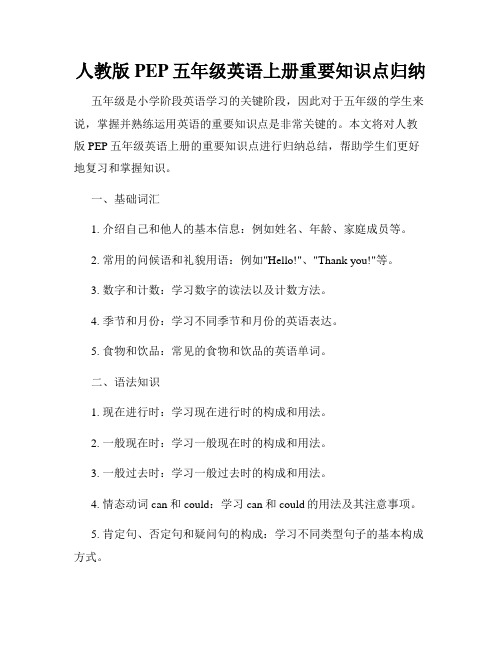
人教版PEP五年级英语上册重要知识点归纳五年级是小学阶段英语学习的关键阶段,因此对于五年级的学生来说,掌握并熟练运用英语的重要知识点是非常关键的。
本文将对人教版PEP五年级英语上册的重要知识点进行归纳总结,帮助学生们更好地复习和掌握知识。
一、基础词汇1. 介绍自己和他人的基本信息:例如姓名、年龄、家庭成员等。
2. 常用的问候语和礼貌用语:例如"Hello!"、"Thank you!"等。
3. 数字和计数:学习数字的读法以及计数方法。
4. 季节和月份:学习不同季节和月份的英语表达。
5. 食物和饮品:常见的食物和饮品的英语单词。
二、语法知识1. 现在进行时:学习现在进行时的构成和用法。
2. 一般现在时:学习一般现在时的构成和用法。
3. 一般过去时:学习一般过去时的构成和用法。
4. 情态动词can和could:学习can和could的用法及其注意事项。
5. 肯定句、否定句和疑问句的构成:学习不同类型句子的基本构成方式。
三、日常用语和交际技巧1. 日常生活用语:学习在生活中常用到的一些英语表达,例如购物、问路等。
2. 与他人交流:学习与他人进行简单交流的技巧,例如如何提问和回答问题等。
3. 听力和口语训练:通过听力和口语训练,提高学生对英语听力和口语的理解和运用能力。
四、阅读和写作能力1. 阅读理解:学习阅读英语短文的技巧,理解短文的内容并回答相关问题。
2. 书写规范:学习书写英文字母和基本的英文单词,提高书写的规范性和准确性。
3. 书面表达:通过写作训练,提高学生的英语书面表达能力。
五、歌曲和游戏1. 学习歌曲:通过学唱英文歌曲,提高学生的英语语感和发音能力。
2. 英语游戏:通过英语游戏的方式,增加学生对英语学习的兴趣和参与度。
六、语音和发音1. 学习国际音标:了解国际音标的基本知识,提高发音的准确性。
2. 发音注意事项:学习一些常见的发音错误及其纠正方法。
以上就是人教版PEP五年级英语上册的重要知识点归纳总结。
新人教版PEP五年级英语上册各单元重点知识归纳

新人教版PEP五年级英语上册各单元重点知识归纳Unit 1: Hello!- Greetings: Hello, Hi, Good morning, Goodbye- Introducing oneself: My name is..., I'm..., Nice to meet you- Numbers: 1-20- Classroom objects: desk, chair, book, pen, pencil, rulerUnit 2: My Schoolbag- Stationery items: eraser, pencil sharpener, glue, crayons, scissors - Colors: red, blue, green, yellow, black, white- Personal pronouns: I, you- Plural forms of nouns: pens, pencils, rulers, booksUnit 3: My Friends- Adjectives: happy, sad, tall, short, thin, fat- Describing appearance: He/She is..., They are...- Possessive adjectives: my, your, his, her, their- Talking about friends: I have a friend. His/Her name is... Unit 4: My Home- Rooms in a house: living room, bedroom, kitchen, bathroom - Prepositions: in, on, under, near- Furniture: sofa, bed, table, chair- Demonstrative pronouns: this, that, these, thoseUnit 5: Food and Drinks- Food items: apple, banana, orange, sandwich, hamburger- Drinks: water, milk, juice, tea- Expressing likes and dislikes: I like..., I don't like...- Question words: What, Where, WhoUnit 6: At the Market- Fruit: grapes, strawberries, watermelon, pineapple- Vegetables: carrot, tomato, onion, potato- Countable and uncountable nouns: an apple, some bananas, a glass of milk- Shopping phrases: How much is..., I want...Unit 7: In the Park- Outdoor activities: play football, fly a kite, ride a bicycle- Weather: sunny, rainy, windy- Present continuous tense: I am playing, He is running- Adverbs: slowly, quicklyUnit 8: My Family- Family members: father, mother, brother, sister- Describing relationships: This is my..., He/She is my...- Possessive 's: Dad's book, Mom's bag- Expressing family activities: We have dinner, We go swimmingUnit 9: At the Zoo- Animals: panda, lion, elephant, giraffe, monkey, tiger- Describing animals: big, small, tall, short, fast, slow- Present simple tense: Lions eat meat, Monkeys swing on trees - Plural forms of animals: pandas, monkeys, tigersUnit 10: At the Farm- Farm animals: cow, horse, pig, chicken, goat- Animal sounds: moo, neigh, oink, cluck, baa- Expressing abilities: I can..., He/She can...- Prepositions of location: in front of, behindUnit 11: Nature Park- Nature elements: river, tree, flower, grass, mountain- Adverbs of frequency: always, usually, sometimes, never- Asking about preferences: Do you like..., Which do you like...Unit 12: Let's Celebrate!- Festivals: Christmas, Spring Festival, Easter, Halloween- Activities during festivals: decorate, light candles, give gifts - Recounting past events: Last year, I..., We...。
- 1、下载文档前请自行甄别文档内容的完整性,平台不提供额外的编辑、内容补充、找答案等附加服务。
- 2、"仅部分预览"的文档,不可在线预览部分如存在完整性等问题,可反馈申请退款(可完整预览的文档不适用该条件!)。
- 3、如文档侵犯您的权益,请联系客服反馈,我们会尽快为您处理(人工客服工作时间:9:00-18:30)。
Unit 1 What’s he like ?单词1. 描述人的外貌单词old 年老的young年轻的tall 高的short 矮的strong 强壮的thin 瘦的2.描述人的性格的单词funny滑稽的kind 和蔼的strict严格的polite 有礼貌的hard-working 工作努力的helpful能干的clever 聪明的shy 害羞的3.其他单词sometimes有时will 将要know 知道robot机器人finish 完成he’s=he is 他是who’s=who is谁是Mr先生Miss 小姐Ms 女士speak English 说英语语音-y [i] baby 婴儿happy 高兴windy 刮风的sunny 晴朗的sorry 抱歉句型Ms Wang will be our new Chinese teacher.王女士是我们新语文老师What’s she like? 她怎么样?She’s very kind.她很和蔼。
Is she strict? 她严格吗?Yes, sometimes.是的,有时候. | Do you know Mr Young?你认识杨先生吗?No,I don’t .不,不认识。
Yes,I do是的,我认识。
Who is your maths teacher? 谁是你的数学老师?Mr Li李先生。
Is he funny? 他严格吗?Yes,he is.是的,他搞笑。
No,he isn’t.不,不搞笑。
语法点1.Be(is, am, are) 的用法口诀be动词am is are ;我(I)用am,你(you)用are; is连着他,她,它(he, she, it); 我们,你们和他们(we, you, they),全部都用are2. be like与do like:What’s…like?是问”某某长什么样子?”的意思。
它的答语一般用:He/She/ It is…(后面跟描写人的外貌特征的词语)。
而在Whatdoes … like? 的句子中,like是“喜欢”的意思。
如:What does your father like? 你的爸爸喜欢什么?它的答语是He/She/ It likes…(后面跟喜欢的东西)。
Unit 2 My week单词星期一到星期天,首字母要大写。
Monday 星期一Tuesday星期二Wednesday星期三Thursday星期四Friday星期五Saturday星期六Sunday星期日weekend 周末often通常cooking烹饪tired疲惫的should 应该schedule 日程安排短语wash my clothes洗衣服watch TV看电视do homework做家庭作业read books读书play football踢足球play sports做体育运动every day每一天do housework做家务语音ee [i:] feet 脚beef 牛肉meet 见面ea [i:] tea 茶read 阅读eat 吃句型What do you have on Thursdays ? 星期四你有什么课?I have maths, English and music.我有数学课,英语课和音乐课。
What do you do on Wednesdays?你星期三都在做什么?I often do my homework . 我通常在写我的家庭作业。
What do you often do on the weekend?你周末常干什么?I often watch TV.我常看电视.Sometimes I read books. 有时候我看书。
Do you often read books in this park? 你常常在这个公园读书吗?No, I don’t.不,我不经常在这看书。
Yes, I do. 是的,我经常。
What do we have on Wednesdays ?星期三我们都有什么课?We have English、science and computer on Wednesdays.我们星期三有英语、科学和计算机。
What day is it today?今天是星期几?It’s Monday.今天是星期一。
You look tired. 你看起来很累。
You should play sports everyday. 你应该每天做运动。
语法点1. 合成词:两个简单的单词放在一起,变成一个新的单词,如:bedroom,classroom2. in, on ,at 后面跟表示时间的词语时(1)表示在某段时间,如在上午,下午,晚上用in.如in the morning, in theafternoon, in the evening.(2)表示在某日,在星期几时,用on。
如on Monday, on Sunday . (3)表示在几点几分,在几点时,用at. 如at 6:30, at 9 o’clock. 3.理解、区分这两个句型What do you have on Mondays? (周一你们都有什么课?)We have Chinese, English, math and science on Mondays.What do you do on Mondays? (周一你都做什么?)I often do homework, read books and watch TV.Unit 3 What would you like ?单词1.食品类(hungry 饿的时候吃eat)sandwich三明治salad沙拉hamburger汉堡包ice cream冰淇淋2.饮料类(thirsty 渴的时候喝drink)tea茶milk牛奶juice果汁 water 水3.形容味道类单词fresh新鲜的healthy 健康的delicious美味的hot辣的sweet甜的4.其他类drink喝thirsty渴的favourite最喜欢的food食物onion 洋葱语音ow [au] cow 奶牛flower 花WOW 哇down 向下ow [əʊ] slow 慢的snow 雪yellow 黄色window 窗户句型What’s your favorite food? 你最喜欢的食物是什么?My favourite food is fish.我最喜欢的食物是鱼。
What would you like to eat? 你想吃什么?I’d like some noodles我想吃面条。
What would you like to drink ? 你想喝什么?I’d like some water. I’m thirsty我要一些水,我渴了。
My favorite foot is ice cream .It is sweet. 我最喜欢的食物是冰淇淋,它很甜。
I don’t like beef but chicken is OK我不喜欢牛肉但是鸡肉可以。
I like vegetables but not carrots我喜欢蔬菜,但是不喜欢胡萝卜。
语法点1.吃饭时,询问他人想吃和想喝什么时,----What would you like to eat/drink? (你想要吃/喝什么?)----I’d like a sandwich/hamburger/ an egg, please(我想要一个三明治/汉堡/蛋.)tea/milk/juice/water, please. 我想要点茶/牛奶/果汁/水。
注意:可数的食物也可以在前面加上数字,表示几个,如:I’d like two hamburgers/three sandwiches/five hot dogs, pl ease.我想要两个汉堡/三个三明治/五个热狗.2.当你想知道你朋友或父母最爱吃的食物或最爱喝的东西是什么时,---What’s your favourite food/drink?---Ice cream. It’s sweet./ Juice. It’s healthy.3.单词的复数形式(1)一般情况下,在单词后面直接加s;(2)以o, s, x, ch, sh结尾的单词,加es;(3)people, fish,sheep单数形式和复数形式一样,不加s.Unit 4 What can you do ?单词dance跳舞cook烹饪swim游泳we’ll=we will party聚会next下一个wonderful极好的learn学习any若干no problem没问题want想要send邮寄Email电子邮件短语sing English songs唱英文歌曲play the pipa弹琵琶do kung fu练武术draw cartoons画漫画play basketball打篮球play ping-pong打乒乓球speak English说英语语音oo [u] book 书look 看football 足球good 好oo [u:] balloon 气球food 食物zoo 动物园noodles 面条句型当举办宴会时,调查同学们会什么时,可以这样问:---What can you do for the party? (你能为聚会做什么?)---I can dance/do kung fu/ play the pipa. (我会跳舞/打武术/弹琵琶。
)----Wonderful极好的。
---Can you swim/cook/play ping-pong? (你会游泳/烹饪/打乒乓球吗?)----Yes.,I can. 是的,我会。
/ No, I can’t.不,我不会。
---I can’t do any kung fu . 我不会武术。
---No problem. I can help you. 没问题,我会帮你的。
**************************************.请给我发送电子邮件。
语法点1.乐器名词前要加the,但是球类名词前不加the。
play the pipa play the erhu play the piano play the violinplay football play basketball play volleyball play ping-pong2.can的用法陈述句肯定式:主语+can + 动词。
m如:I can cook. 我会做饭。
陈述句否定式:主语+can +not + 动词。
如:I can not / can’t cook. 我不会做饭。
